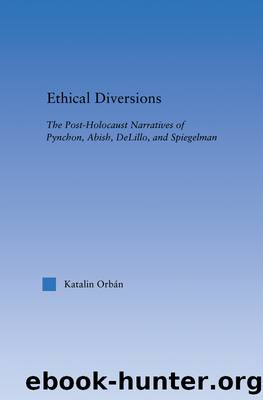Ethical Diversions by Orbán Katalin

Author:Orbán, Katalin.
Language: eng
Format: epub
Publisher: Taylor & Francis (CAM)
Open-ended as Abishâs text is, I think it is a mistake to cast it as a âself-begetting novelâ that ââbegins again where it ends,ââ comprising a cycle as a whole. This argument of Saalmannâsâmade in the framework of reader response theoryâseems valid, however, on the more microscopic level of narrative forgetfulness where the text indeed presents âprojection [s] which nee[d] ceaselessly to be remade.â57
Most importantly, what such narrative forgetfulness makes visible is a convulsive production of memory and forgetting: both memory and forgetting as ceaselessly renewable assignations. Once forgetting is understood through forgetfulness, a traumatic past has to be forgotten over and over again. Once approached through forgetfulness, memory is similarly a retaking of the past that calls for ceaseless renewal. If one insists on the calm of forgetting rather than this convulsion, How German Is It will be a different novel indeed. It will offer solid lacunae of âellipsis and mystery,â which prompt a ââfilling-in processâ and the readerâs perception of âthe noumena or basic truths underlying West German reality.â58 Once the novel is read as a novel of forgetting, the solidity and stability of the âwithheld informationâ will inevitably imply a potential for the solid and stable restoration of truth, âthe actual shape of things,â not to mention âdesensitized moral conscience.â59
What a forgetful How German Is It offers, however, is a âHolocaustâ and a concomitant problem of ethical response that, as soon as they are formed, are always undone through the obsessive, compulsive reinvention that removes them from the sphere of the already-familiar. It is as if âRemember Holocaustâ were included among reminders of quotidian (narrative) life, ephemeral diary jottings in which memory and reminder become indistinguishable: âHe didnât keep a journal. He just jotted things down in an office diary. Dinner with Daphne. Jägerschnitzel mit Pilzen. That seemed adequate for his purposes. Also mention of the newsflash. Two dead in an explosion at the post office. 7th of June accepts responsibility. Coffee and Fürst Pückler Torte. Watch the late news on TV. Make loveâ (HGI 41). This notion of remembrance is both more frivolous (in its quotidian ephemerality) and grave (in its excessive need for repetition and renewal) than a monumental memorialization of the Holocaust.
The gravity of forgetfulness so understood is demonstrated on a different level by what seems like Abishâs compulsion to keep reiterating, renewing and reinventing this work.60 The extent to which âThe English Garden,â âThe Idea of Switzerland,â How German Is It, and most recently the work in progress House on Fire, taken together, constitute a rewriting goes well beyond the âfamiliarâ genres of version and sequel or the common phenomenon of an authorâs interest in a particular topic. In House on Fire, the text recreates âGermanyâ once again through the twin towns of Selten [ârareâ] and Altneu [âoldnewâ], through Brumhold and the German language, once again exploring the problematic German relation to the past and history, the embrace of perfection and (im)perceptibility of change. The recently built modern edifices, like the Stalh-Einz building
Download
This site does not store any files on its server. We only index and link to content provided by other sites. Please contact the content providers to delete copyright contents if any and email us, we'll remove relevant links or contents immediately.
Machine Learning at Scale with H2O by Gregory Keys | David Whiting(4282)
Never by Ken Follett(3921)
Fairy Tale by Stephen King(3355)
Reminders of Him: A Novel by Colleen Hoover(3062)
The Man Who Died Twice by Richard Osman(3055)
Will by Will Smith(2891)
It Starts With Us (It Ends with Us #2) by Colleen Hoover(2318)
Can't Hurt Me: Master Your Mind and Defy the Odds - Clean Edition by David Goggins(2309)
Friends, Lovers, and the Big Terrible Thing by Matthew Perry(2208)
The Dawn of Everything: A New History of Humanity by David Graeber & David Wengrow(2181)
The Becoming by Nora Roberts(2178)
The Stranger in the Lifeboat by Mitch Albom(2104)
Love on the Brain by Ali Hazelwood(2046)
New Morning Mercies: A Daily Gospel Devotional by Paul David Tripp(1906)
The Strength In Our Scars by Bianca Sparacino(1832)
HBR's 10 Must Reads 2022 by Harvard Business Review(1828)
A Short History of War by Jeremy Black(1827)
Go Tell the Bees That I Am Gone by Diana Gabaldon(1743)
A Game of Thrones (The Illustrated Edition) by George R. R. Martin(1693)
